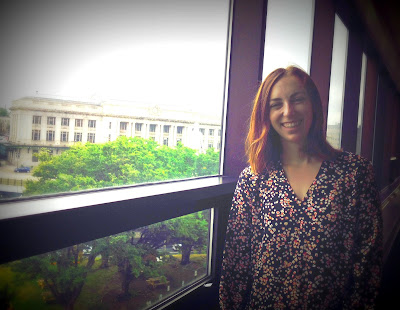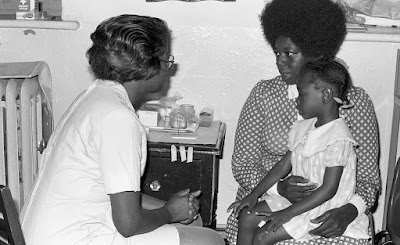 |
| Caitlin sizes up the scene |
When Caitlin Rathe, a student at University of California Santa Barbara, jetted into chilly Baltimore from the sunny Left Coast last February, she wasn’t entirely sure she was going to find what she was searching for. Rathe is a doctoral student in history, who has been focused on the story of welfare and how it changed in the United States during the late 20th century. She narrowed her focus on 1970s and 1980s-era food assistance in order to make the topic more manageable. Conversely, that’s when things got tricky.
It turns out that source materials for information about food pantries in particular are hard to come by, and when such records can be unearthed, Caitlin says that they usually don’t extend very far back in time. After a nationwide search, Rathe found out that Langsdale Library Special Collections houses a cache of food pantry records dating to the 1970s and 1980s.
After her initial week-long foray into Special Collections, Rathe has returned to Baltimore as one of two Special Collections research Fellows (UB’s own Stephanie Dolamore is the other, whose work will be highlighted in a future blog post) who were awarded grants to investigate structural inequality in Baltimore.
We asked Caitlin to elaborate on the work she’s doing this summer via a barrage of questions.
Where are you from—what school, et cetera?
CR: I grew up about 30 minutes east of Seattle. I received my bachelor’s degree from Willamette University in Salem, Oregon and am now in the History Ph.D. program at the University of California, Santa Barbara where I’ve spent the last 5 years.
Do you have a full-time job?
CR: I’ve been a full-time graduate student at UC Santa Barbara for the past 5 years, and worked as a teaching assistant and research assistant during that time. Before that, I taught English as a second language in France, and way before that I was a barista. It is a right of passage for Seattle-ites: one must make coffee.
What’s your focus of study, and how does your research here tie into that?
CR: I study the history of welfare in the late 20th century, and in particular I am interested in the changing relationship between public and private assistance. To have a manageable research project, I chose one area of welfare policy to focus in on: food assistance. So I look at food programs during the 1970s and 1980s, ranging from public programs, including food stamps and school lunches, to private organizations, like food banks and soup kitchens.
What I find really fascinating is the interaction between the public and private sector. In between the categories of public and private, there is a whole messy world of private contracts for public services and other relationships that blur the line between strictly public and private action. Which brings me to why I am at Langsdale Library. In Special Collections, the library has the only publicly available records of a food bank that I’ve found anywhere in the U.S. So I am here checking out the papers of the Maryland Food Bank, along with other non-profit organizations.
What kinds of research are you hoping to accomplish with regards to this grant?
 |
| Fortified Milk Program Clinic, from the Robert Breck Chapman (RBC) Collection, via Flickr |
CR: The summer fellowship is giving me the time to carry out research that I will use in my dissertation. Using the library’s extensive records in the Baltimore Regional Studies Archives, I plan to comb through all the food bank records during this summer, while also exploring records in other collections that deal with hunger, malnutrition, and changes to welfare more broadly. So far this summer, I’ve been learning about a Baltimore City Task Force on Nutrition in the early 1970s, a statewide study on malnutrition during the mid-1970s, and changes to federal school meal policies that impacted Baltimore public schools. Putting all of these records together will help me better understand how national policy changes [affected] states and localities, giving me insight into how food assistance worked in a city, how national policy changes impacted a local non-profit sector, and how this changed over time.
What does structural inequality mean to you?
CR: Structural inequality is the system of political and economic barriers that has been deliberately constructed through policy, leading to unequal access to the rights of citizenship. By this I mean that people have actively created divided systems of education, employment, housing, and voting that benefit a small group instead of everyone. To me, to study structural inequality is to denaturalize this system, and explore alternate ways to use policy to construct a just society.
Any comments about our archives? Langsdale? Baltimore in general?
CR: There are so many great records here! I can only speak to what I’ve looked through so far, but to anyone interested in post-war politics, economics, and governance, the collections here are excellent. As I’ve looked through the records of the Citizen’s Planning and Housing Association or the Maryland Committee for Children, I’ve imagined doing research projects on urban renewal, Model Cities, the history of Head Start, and federal housing policy (which my fellow Fellow Stephanie is taking on!). The archivists and staff are a pleasure to work with and so willing to help in any way they can. And I’ve only just begun to get to know Baltimore, but I hope it’s a city I return to often.